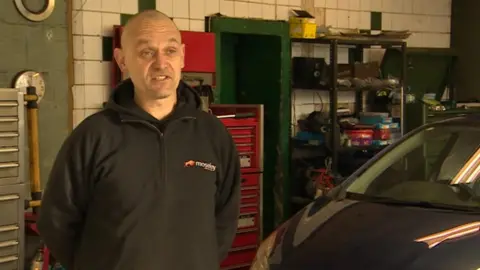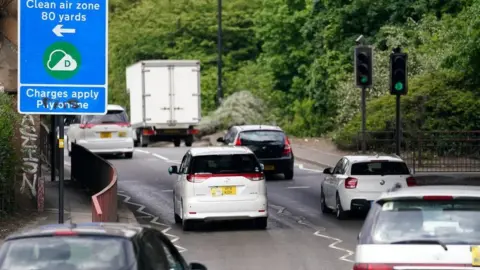CAZ: Driver numbers within Birmingham zone drop by 6,000
 BBC
BBCAbout 6,000 fewer vehicles are driving within Birmingham's Clean Air Zone (CAZ), new figures show.
The zone, introduced in a bid to reduce air pollution, officially launched in June.
Waseem Zaffar, the cabinet member for transport and environment at Birmingham City Council, said it was happy with the impact the zone is having on air quality.
But some businesses said it was having a negative impact on their trade.
Vehicles that do not meet the emissions standards for the zone, which covers roads inside Birmingham's A4540 Middleway, face charges of £8 for cars, vans and taxis, or £50 for HGVs and coaches, rising to £120 if unpaid within six days.
 PA Media
PA MediaData from Aston University shows far fewer of the more polluting vehicles are being driven into the city centre.
Although the full impact will not be clear until 2022, Dr Stephen Worrall - an atmospheric chemist at the university - said before charging was introduced, the number of daily non-compliant vehicles driving within the zone was an average of 18,787, but this dropped to 11,850 for the remainder of June with the last reported daily average of 10,800 for August.
The figures, he said, showed a "step in the right direction to improving our air quality and health".
But Andrew Masters, manager of Moseley Automotives, said footfall was down and it had closed down a site at Bull Ring Automotive following the introduction of the CAZ.
"We obviously saw a significant reduction in our bookings," he said.
"The owner made the decision to close that site and consolidate here... but it did result in some redundancies."

Pat Pryce, from florist Nelly Kelly, said he invested in an electric bike to allow for city deliveries to avoid charges and has moved more trade online.
Mr Zaffar said the council was supporting businesses, and has £40 million in grants from the government to hand out.
"Our aims are to improve air quality, reverse health inequalities in our city, end the scandal in our city where up to 1,000 people are dying prematurely each year because of poor levels of air quality," he said.

Follow BBC West Midlands on Facebook, Twitter and Instagram. Send your story ideas to: [email protected]
